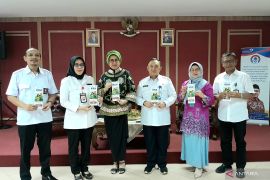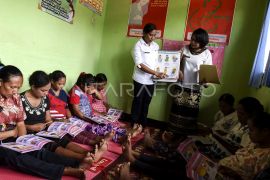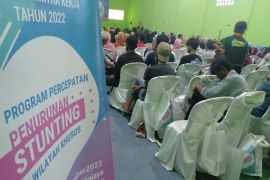"Apart from stunting, the common enemy that must be fought is extreme poverty and maternal and infant mortality rates, which are still relatively high," BKKBN head Hasto Wardoyo said in a written statement issued in Jakarta on Tuesday.
At the meeting of the Family Planning Extension Association (IPeKB) for East Kalimantan and North Kalimantan provinces on Monday evening, Wardoyo stated that the prevalence rate of stunting in Indonesia is still quite high at 24.4 percent.
The stunting rate is the 20-percent threshold set by the World Health Organization (WHO). According to the National Socioeconomic Survey (Susenas) in March 2021, the number of people experiencing extreme poverty in Indonesia reached 27.54 million or 10.14 percent.
Meanwhile, in September 2021, the number of people experiencing extreme poverty was declared to have fallen to 26.50 million or 9.71 percent. Poverty can reduce children's access to balanced nutrition.
This includes access to health services and clean water, especially during the golden period, namely the first thousand days of life (HPK).
"Globally, we have challenges; what is already in front of our eyes is high stunting, if that (along with poverty) is considered a common enemy, we will designate it as a common enemy," Wardoyo said.
Apart from causing stunting, poverty is one of the factors behind high maternal mortality rates (MMR) and infant mortality rates (IMR).
He then asked IPeKB as a professional organization to be a learner, wherein its members can mature and develop well to achieve a shared vision, which includes reducing the stunting rate to 14 percent by 2024.
He also asked all parties, not only IPeKB, to make extreme poverty a common enemy so that all the convergence that is carried out can focus on one main problem and provide optimal handling.
"If it becomes part of a common enemy, then create it all as a common enemy," he added.
Meanwhile, head of the BKKBN’s Representative Office for East Kalimantan province, Sunarto, said he hopes that the IPeKB gathering will lead to creative ideas to support the implementation of the Family Development, Population, and Family Planning (Bangga Kencana) and Accelerated Stunting Reduction (PPS) programs.
"Hopefully, with the inauguration of the East Kalimantan and North Kalimantan IPeKB management, we can create innovative creative ideas to accelerate the achievement of the Bangga Kencana program and, of course, also accelerate the acceleration of the reduction in stunting rates in East Kalimantan and North Kalimantan," he added.
Related news: Need integrated efforts to accelerate stunting reduction: Ministry
Related news: Community urged to protect pregnant women from anemia: ministry
Translator: Hreeloita D, Azis Kurmala
Editor: Rahmad Nasution
Copyright © ANTARA 2022












